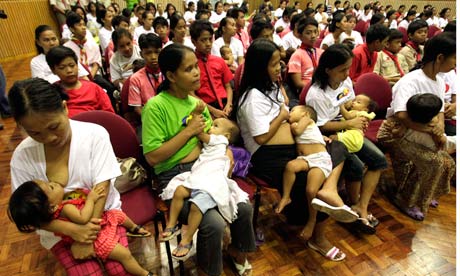
We live in a divided world, but the first months of our lives are the most divisive of all. Globally, millions of babies and children die each year before their fifth birthday. Geographically, 99% of these childhood deaths occur in poor countries.
On Monday, a breastfeeding report from Save the Children offered a useful new piece of armour in the global fight against infant mortality. Superfood for Babies says the lives of 95 babies could be saved every hour worldwide – 830,000 a year. Given within an hour of birth, colostrum – mother's first milk – kickstarts children's immune systems, making them three times more likely to survive.
Save The Children has called for cigarette-packet style warnings on boxes of formula milk covering a third of the packaging that explain why breastfeeding is so important – giving women in developing countries the chance to make up their own minds.
Yet in the Daily Mail, breastfeeding guru Clare Byam-Cook calls the report "emotive", as if we should be calm about the deaths of 95 babies an hour. The packaging, she claims, will make formula feeding mothers feel like "failures". And two-thirds of women surveyed agree with her, apparently.
No one wants to increase the sadness many women may feel when they are unable to breastfeed. Breastfeeding can be impossible for many reasons, and it's certainly a long way from "just lie baby on your chest and they'll suck right away". But is our world really so unfairly weighted that the hurt, guilty feelings of a minority of western women count more than an annual loss of life that's three times the death toll of the 2004 tsunami? Is that what two-thirds of British women really think? This is a curious kind of privilege.
UK packaging – on which the "breastfeeding is best" advice is written in the minuscule writing that used to appear on cigarette packets – has to change not to attack British women, but because of import and export of the products. And the parallel between formula milk and fag packets is instructive. Both are aggressively marketed in poor countries now that rich countries have woken up to the health benefits of banning their advertising. Like the tobacco companies, the formula companies know they need pastures new to ply their wares. In the Philippines, the government has fought back with new laws to prevent aggressive marketing, but there are already legal challenges in the courts. Another parallel: both are habit-forming. Once a woman is regularly and exclusively using formula it is unlikely she will be able to go back to breastfeeding, even if she can no longer afford the substitute or has only dirty water to mix it with.
In reality, this is not a debate about the merits of BF v FF – as the shorthand on mothers' blogs such as Mumsnet would denote it – for western women. Whether you BF (breastfeed) or FF (formula feed) or EBF (exclusively breastfeed) in the UK the likelihood is that you have access to clean water, to sterilising equipment or tablets, and that you had an option to attend some local council or NCT classes to help you decide how to feed your DD (darling daughter) or DS (dear son). Yes, there are health benefits for western children from breastfeeding, but they are unlikely to be life and death the way they can be for children from poor countries.
The defensive response to the report says less about the appalling scenario in which many women in developing countries find themselves, and more about how the breastfeeding debate is unnecessarily dividing women in the UK, aided and abetted by the formula industry. If, as Byam-Cook says, "mothers … are treated like bad people when buying [formula]", then we should get our own house in order. We need to look at how we have allowed the debate around breastfeeding to become so divisive and intolerant. Why would one woman want to judge another about the way they feed their baby?
In the end, it is every woman's right to be empowered, informed and educated enough to make our decisions about how we feed our children. At the moment, that is not happening in a substantial part of the planet – and that should make us all feel like failures.

